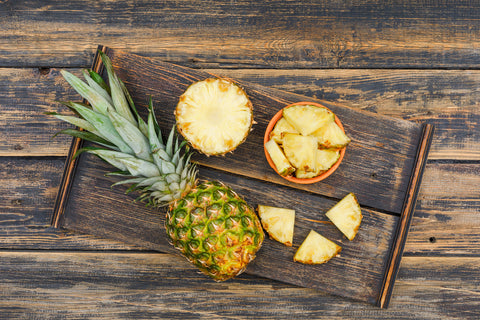Bromelain is a type of proteolytic (helps brake down proteins) enzymes, found in pineapple fruit (especially in stems or cores). Bromelain is composed of several endopeptidases and compounds like peroxidase, phosphatase, glucosidase, escharase, cellulase, and protease inhibitors. It is a powerful digestive aid effective in the entire digestive system including in the presence of stomach acid and also in the alkaline environment of the intestines.
Food Sources of Bromelain
The best by far source of Bromelain is fresh (not canned) Pineapple (especially the core).

Health Benefits
According to over 1,600 scientific papers attempting to evaluate the health benefits of bromelain, it can be beneficial in the following health problems: Allergies, hay fever (allergic rhinitis) & asthma, joint pain, cellulite, digestive problems including indigestion, heartburn, or diarrhoea, sprained ankles, overweight, excessive blood clotting, inflammatory bowel disease, bronchitis, sinusitis, heart problems, weak immunity, connective tissue injuries, inner thigh discolouration (dark inner thighs), etc.
Bromelain is also recommended for wounds or burns (to speed up healing) but it shouldn’t be taken immediately after surgery without consulting it with a doctor, as Bromelain reduces blood clotting and therefore may increase bleeding!
Joint Health
Due to its analgesic and anti-inflammatory properties, Bromelain can be beneficial in soothing pain. According to one study, a group of participants with osteoarthritis were given capsules with 650 mg of Bromelain two to three times a day on an empty stomach. As a result, the inflammation and pain were reduced by up to 60%! (>)
Digestive Problems
Bromelain helps to heal the gastrointestinal tract lining and is effective against various digestive and gastrointestinal problems simply because it is an enzyme that helps to digest proteins. It also supports absorption of nutrients. It is known to ease colon inflammation and symptoms of autoimmune inflammatory bowel disease by reducing secretion of pro-inflammatory cytokines which damage the gut lining.
Allergies
It has been known for a long time that Bromelain can help reduce symptoms of allergy, hay fever or asthma including runny nose, itchy eyes, or difficulty breathing. The key cause of allergies, asthma is oversensitivity of human immune system which triggers immune reaction and release of histamine when there is no need to do so.
We know that this strange behaviour has a lot to do with stress, anxiety, low mood and depression, deficiency of vitamin D, zinc, selenium magnesium, and overconsumption of heated animal protein.
However, it was found that also in this case Bromelain may be very helpful because it can positively modulate the immune system, reduce its oversensitivity, decrease allergic reactions and even stop inflammatory responses of the immune system that affect the airways.
According to certain study, a specific type of dendritic cells and antigen-presenting cells of the immune system were not overreacting and causing asthma or allergies in participants who were on Bromelain.
Sinusitis
According to one study 12 patients sinusitis were treated with a daily dose of 600-milligram Bromelain (300 FIP units) for three months. As a result, the participants reported significant improvement of improved symptoms with no adverse effects.
Blood Clotting
Bromelain increases prothrombin time (PT), which helps prevent coagulation (blood clotting) and therefore can be beneficial in preventing Pulmonary Embolism in people with Deep Vein Thrombosis (DVT). However, if you are on blood thinning medication such as warfarin you must consult your doctor about supplementing with Bromelain and for dosage recommendation, because using Bromelain together with medication may thing the blood too much and increase risk of internal bleeding.
Weight Loss
Bromelain also seems to help with weight loss due to its ability to down-regulate adipocyte fatty acid-binding protein, lipoprotein lipase and fatty acid synthase. It also helps maintaining normal body weight by reducing triglyceride (type of body fat) accumulation and inhibiting adipogenesis (cell differentiation that can contribute to formation of fat cells).
Inflammation
Since Bromelain has anti-inflammatory properties it can be used to reduce inflammation and pain. For instance, according to one study Bromelain was able to sooth pain, decrease swelling and inflammation. It also enhanced wound healing after tooth extractions. Participants of the study who were on bromelain reported significantly lower post-operation inflammation, swelling and pain.
Sports Injuries
Bromelain may speed up healing time after a physical or sport injury. It results in reduced swelling from sprains, strains, bruises, and other minor muscle injuries.
Varicose Veins & Haemorrhoids
Because it has positive effects on swelling, irritation, and wound healing, bromelain can be used to soothe haemorrhoids and varicose veins.
Contraindications
-
Bromelain is very unlikely to cause side effects. However, since it helps prevent blood clots, it is important to consult your physician if you are on blood-thinning medications.
-
Avoid taking Bromelain immediately after surgery without consulting it with your doctor, as Bromelain reduces blood clotting and therefore may increase bleeding!
-
Remember that Bromelain may also increase absorption of antibiotics and other medications.
Units of Measurement
Bromelain enzymatic activity can be measured in various ways. The listed below different units express the activity level of the enzyme; the higher the number, the more active it is.
- Gelatine digesting units (GDU/gram)
- FIP units (amount that hydrolyzes casein)
- Casein Digestion Units (CDU/mg)
- PU (Papain Units)
- Milk clotting units (MCU)
- Rorer units (RU)
- Bromelain Tyrosine Units (BTU/ gram)
References
- https://draxe.com/6-unbelievable-health-benefits-bromelain/
- https://www.globalhealingcenter.com/natural-health/bromelain/
- https://www.ncbi.nlm.nih.gov/pubmed/23570457
- https://www.sciencedirect.com/science/article/pii/S095980491400519X
- https://www.ncbi.nlm.nih.gov/m/pubmed/18160345/
- https://www.ncbi.nlm.nih.gov/pubmed/15936249
- https://www.ncbi.nlm.nih.gov/pubmed/28217537
- https://www.ncbi.nlm.nih.gov/pmc/articles/PMC538506/
- https://www.ncbi.nlm.nih.gov/pmc/articles/PMC3870104/
- https://www.ncbi.nlm.nih.gov/pubmed/24273953
- Pavan R, et al. “Properties and Therapeutic Application of Bromelain: A Review.” Biotechnol Res Int. 2012; 2012,976203.
- Brien S, et al. “Bromelain as an adjunctive treatment for moderate-to-severe osteoarthritis of the knee: a randomized placebo-controlled pilot study.” QJM. 2006;99(12),841-50.
- Rathnavelu V, et al. “Potential role of bromelain in clinical and therapeutic applications.” Biomed Rep. 2016;5(3),283–288.
- Onken JE, et al. “Bromelain treatment decreases secretion of pro-inflammatory cytokines and chemokines by colon biopsies in vitro.” Clinical Immunology. 2008;126(3),345–352.
- Chandler DS, Mynott TL. “Bromelain protects piglets from diarrhoea caused by oral challenge with K88 positive enterotoxigenic Escherichia coli.” Gut. 1998;43(2),196-202.
- Eckert K, et al. “Effects of oral bromelain administration on the impaired immunocytotoxicity of mononuclear cells from mammary tumor patients.” Oncol Rep. 1999;6(6),1191-9.
- Desser L, et al. “Cytokine synthesis in human peripheral blood mononuclear cells after oral administration of polyenzyme preparations.” Oncology. 1993;50(6),403-7.
Any information or product suggested on this website is not intended to diagnose, treat, cure or prevent any medical condition. Never disregard medical advice or delay in seeking it because of something you have read on this website. Consult your primary healthcare physician before using any supplements or making any changes to your regime.





